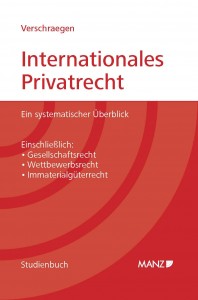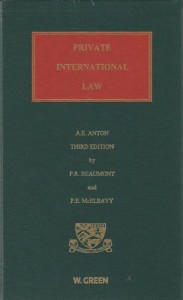Issue 2012.2 Nederlands Internationaal Privaatrecht
The second issue of 2012 of the Dutch journal on Private International Law, Nederlands Internationaal Privaatrecht includes the following articles on Recognition of (Dutch) Mass Settlement in Germany, the CLIP Principles, the European Patent Court and case note on Brussels I and the Unknown Address (Lindner):
Axel Halfmeier, Recognition of a WCAM settlement in Germany, p. 176-184. The abstract reads:
The Dutch ‘Wet Collectieve Afwikkeling Massaschade’(WCAM) [Collective Settlements Act] has emerged as a noteworthy model in the context of the European discussion on collective redress procedures. It provides an opportunity to settle mass claims in what appears to be an efficient procedure. As the WCAM has been used in important transnational cases, this article looks at questions of jurisdiction and the recognition of these court-approved settlements under the Brussels Regulation. It is argued that because of substantial participation by the courts, such declarations are to be treated as ‘judgments’ in the sense of the Brussels Regulation and thus are objects of recognition in all EU Member States. Written from the perspective of the German legal system, the article also takes the position that the opt-out system inherent in the WCAM procedure does not violate the German ordre public, but is compatible with fair trial principles under the German Constitution as well as under the European Human Rights Convention. The WCAM therefore appears as an attractive model for the future reform of collective proceedings on the European level.
Mireille van Eechoud & Annette Kur, Internationaal privaatrecht in intellectuele eigendomszaken – de ‘CLIP’ Principles, p. 185-192. The English abstract reads:
The European Max Planck Group on Conflict of Laws in Intellectual Property (CLIP) presented its Principles in November 2011 to an international group of legal scholars, judges, and lawyers from commercial practice, governments and international organisations. This article sets out the objectives and principal characteristics of the CLIP Principles. The Principles are informed by instruments of European private international law, but nonetheless differ in some important respects from the rules of the Brussels I Regulation on jurisdiction and the Rome I and II Regulations on the law applicable to contractual and non-contractual obligations. This is especially so in situations where adherence to a strict territorial approach creates significant problems with the efficient adjudication of disputes over intellectual property rights or undermines legal certainty. The most notable differences are discussed below.
M.C.A. Kant, A specialised Patent Court for Europe? An analysis of Opinion 1/09 of the Court of Justice of the European Union from 8 March 2011 concerning the establishment of a European and Community Patents Court and a proposal for an alternative solution, p. 193-201. The abstract reads:
Attempts have been made for decades to establish both a Community patent and a centralised European court which would have exclusive jurisdiction in this matter. However, none of these attempts has ever been fully successful. In its Opinion 1/09 from 8 March 2011, the Court of Justice of the European Union (hereinafter CJEU) held, inter alia, that the establishment of a unified patent litigation system as planned in the draft agreement on the European and Community Patents Court would be in breach of the rules of the EU Treaty and the FEU Treaty. However, it is argued in this paper that also in view of Opinion 1/09 the creation of a unified court has not become per se unattainable. After clarifying in whose interest effective patent protection in Europe should primarily be formed, different constellations of judicial systems shall be discussed. The author will deliver his own proposal for a two-step approach in structure and time, comprising, in a first step, the creation of a specialized chamber of the CJEU for patent litigation, and in a second step the creation of a central EU Court for all EU intellectual property litigation. The paper will finish with an analysis of how the requirements for a unified patent litigation system (indirectly) set up by the CJEU in its Opinion 1/09 could be taken into consideration, and with some further deliberations on effective patent protection and enforcement.
Jochem Vlek, De EEX-Vo en onbekende woonplaats van de verweerder. Hof van Justitie EU 17 november 2011, zaak C-327/10 (Lindner) (Case note), p. 202-206. The English abstract reads:
The author reviews the decision of the ECJ in the case of Hypotecni banka/Udo Mike Lindner in which the ECJ ruled on the application of the jurisdictional rules of the Brussels I Regulation in the case of a consumer/defendant with an unknown domicile. Several issues are highlighted: first, the existence of an international element in the case of a defendant with unknown domicile whose nationality differs from the state of the court seized; secondly, the application of Article 4(1) Brussels I Regulation if the domicile of the defendant is unknown and (since the ECJ does not apply Article 4(1) in this regard) the interpretation of Article 16(2) Brussels I Regulation; thirdly, the requirement that the rights of the defence are observed, as also laid down in Article 47 of the Charter of Fundamental Rights of the EU. Additionally, the article briefly mentions the subsequent case of G/Cornelius de Visser, in which a German Court resorted to public notice under national law of the document instituting the proceedings in the case of a defendant with an unknown address.

 The first issue of French Journal du droit international (Clunet) for 2012 was just released. It contains five articles and several casenotes.
The first issue of French Journal du droit international (Clunet) for 2012 was just released. It contains five articles and several casenotes.